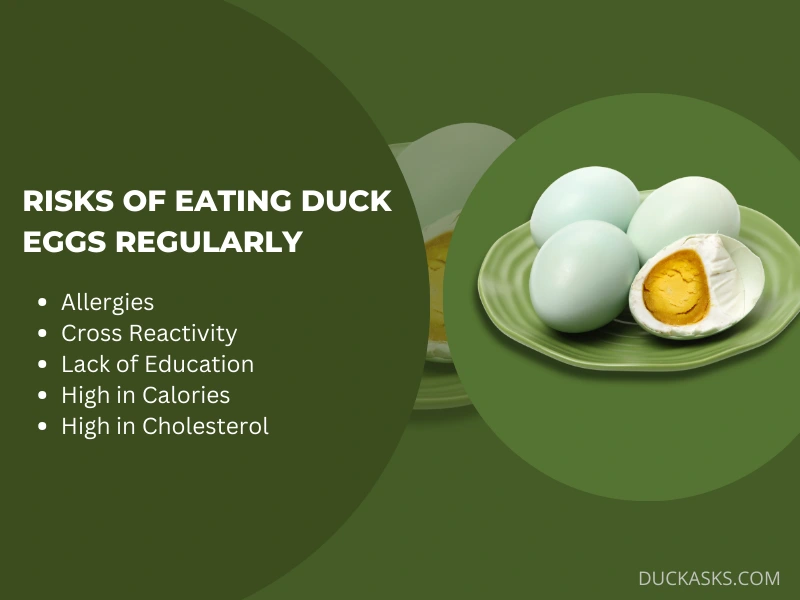Are Duck Eggs Bad for Cholesterol?
If you have high cholesterol, you must be constantly looking for healthy food that doesn’t increase your cholesterol level further. But oftentimes, these healthy diets contain the same regular food that you are bored of eating.
Now, during your food hunt, you may have come across those big-sized duck eggs at the grocery stores. But before you try them, you must find out if duck eggs are bad for cholesterol.
The answer is duck eggs can be bad for high cholesterol if you’re eating them daily. They contain higher levels of dietary cholesterol and can increase HDL (High-Density Lipoprotein) too when consumed correctly.

So, if you’re thinking of including duck eggs in your diet, you need to know the healthiest way of eating them to achieve the best nutrition while avoiding the risks at the same time.
Want to learn more about ducks blog:
Can I Eat Duck Eggs If I Have High Cholesterol?
When your cholesterol level is 240 mg/dL or higher than that, it is considered that you have high cholesterol and are at risk of various heart diseases. But following a healthy lifestyle can definitely reduce the risks.
You need to avoid foods that are high in saturated fat and dietary cholesterol. And duck eggs are also quite high in cholesterol. But they can also offer some health benefits since they contain many essential nutrients as well.
Eggs can raise the level of HDL or good cholesterol. HDL helps you get rid of excess cholesterol by transporting it to your liver and then it’s released from your body.

But eating duck eggs can also increase the level of LDL, which is also known as bad cholesterol. It helps cholesterol build up in your arteries, which eventually can lead to artery block and heart attack.
That means eating duck eggs can help you maintain a healthy HDL-to-LDL ratio.
But it’s only safe for you when you’re consuming it in strict moderation and it’s cooked in a healthy way.
What Is the Healthy Way of Eating Duck Eggs?
When it’s said that duck eggs are high in cholesterol, it’s only the yolks that contain harmful cholesterol. But egg whites are completely free from cholesterol.
So, eating just the egg whites will not cause any harm.
It’s also important to see how you’re cooking your eggs. If you’re frying them in butter and oil and then eating them with bacon and sweets, then it will increase your cholesterol level alarmingly.
Because this ingredient and side dishes contain such high levels of saturated fat that it can easily undermine the good cholesterol that you could get from duck eggs. And eating excessive amounts of fatty food results in high cholesterol.
The healthy way to get the best nutrients while avoiding the risks is to try to eat poached or boiled duck eggs without the yolk. You can add them to your vegetable dish too, to have some protein alongside.
How Much Cholesterol Is in One Duck Egg?
An average-sized duck egg contains 619 mg of cholesterol. And a healthy adult can take only 300 mg of cholesterol per day. But if you already have high cholesterol, you shouldn’t go over 200 mg a day.

However, it’s not only cholesterol that duck eggs are high in. They also contain almost 9gm of protein and a good percentage of different types of vitamins.
Now, chicken eggs and duck eggs are both rich in nutrients and both have dietary cholesterol. You can compare them first to figure out which one would be the best choice for you.
Are Duck Eggs High in Cholesterol Compared to Chicken Eggs?
Since duck eggs are larger than chicken eggs on average, it’s understandable that they are also higher in cholesterol and other nutrients.
But if we take the same amount of each of the eggs, duck eggs will still defeat chicken eggs in the race of cholesterol and other nutritional value.
When 100 g of duck egg contains 884 mg of cholesterol, the same weight of chicken egg has only 372 mg of cholesterol. This means duck eggs should be consumed a lot less frequently than chicken eggs.
Benefits of Eating Duck Eggs
Despite being high in cholesterol, duck eggs also provide essential nutrients for your overall health. Some of them are –

- Duck eggs are rich in protein, vitamin D, vitamin K, calcium, magnesium etc. These nutritional elements are very important for strengthening your bones and healthy muscles.
- Choline and Lecithin are essential substances that help your brain function well. They also help keep our memory sharp, reducing the risk of Alzheimer’s. You can find them both in duck eggs.
- For healthy skin and hair, you need vitamins, minerals and antioxidants. And duck eggs can provide you with all of them. They not only improve your skin but also repair prior damage and hair loss.
Along with these, duck eggs can also promote eye health, mental health and nerve health.
Risks of Eating Duck Eggs Regularly
You should be aware of some of the risk factors of eating duck before making them a regular item in your diet –

Allergies
Duck eggs may trigger allergic reactions in some people since duck eggs contain proteins that can cross-react with allergens found in chicken eggs.
For instance, a Reddit user reported having an allergy to undercooked chicken eggs but could tolerate raw quail eggs.
This demonstrates individual variation in egg allergies. People with known egg allergies should exercise caution when first trying duck eggs.
Cross Reactivity
There is potential for cross-reactivity between chicken and duck eggs because they share allergenic proteins, as shown in studies on eggs from various species.
So, those allergic to chicken eggs may also react to duck eggs. Testing is advised before adding duck eggs if chicken egg allergy exists.
Lack of Education
Many people lack sufficient understanding of tick-borne illnesses and prevention due to inadequate public health education on these topics.
For example, those unaware of Lyme disease risks might not take precautions like using repellent or protective clothing when in tick-infested areas. Improved education is key to avoiding tick-borne disease through preventative actions.
High in Calories
With 130 calories each, duck eggs are higher in calories than chicken eggs. This can hinder weight loss efforts if too many calories are consumed by eating duck eggs regularly.
Moderation is wise for managing calorie intake and diet goals when substituting duck for chicken eggs.
High in Cholesterol
The high cholesterol content of duck eggs (as mentioned earlier 619 mg per egg) could exacerbate heart disease or high cholesterol if consumed excessively. For instance, frequent duck egg intake could raise blood cholesterol levels and cardiovascular risks.
Moderation is important for controlling cholesterol consumption from duck eggs. People with allergies should exercise caution with duck eggs. Education on tick bite prevention is lacking. And duck eggs are very high in cholesterol and calories, so moderation is key. Consulting a doctor is best to weigh duck egg benefits and risks.
Final Words
Duck eggs are a great source of nutrients for all. However, people with high cholesterol should not eat them frequently. If you eat them only once a week, it shouldn’t have any negative impact on your health.
The better option would be eating the egg white only as it doesn’t contain any cholesterol if you can endure the epitome of bland taste. But at least you will have some good protein without risking your heart.
Hopefully, this article helped you decide if duck eggs should be a part of your diet if you have high cholesterol. Stay healthy and stay connected with us on Facebook, Twitter and Pinterest!
References
- https://www.healthline.com/nutrition/duck-eggs
- https://www.webmd.com/diet/health-benefits-duck-eggs
- https://www.healthline.com/health/lecithin-benefits#may-fight-dementia-symptoms
- https://www.mayoclinic.org/diseases-conditions/high-blood-cholesterol/expert-answers/cholesterol/faq-20058468






